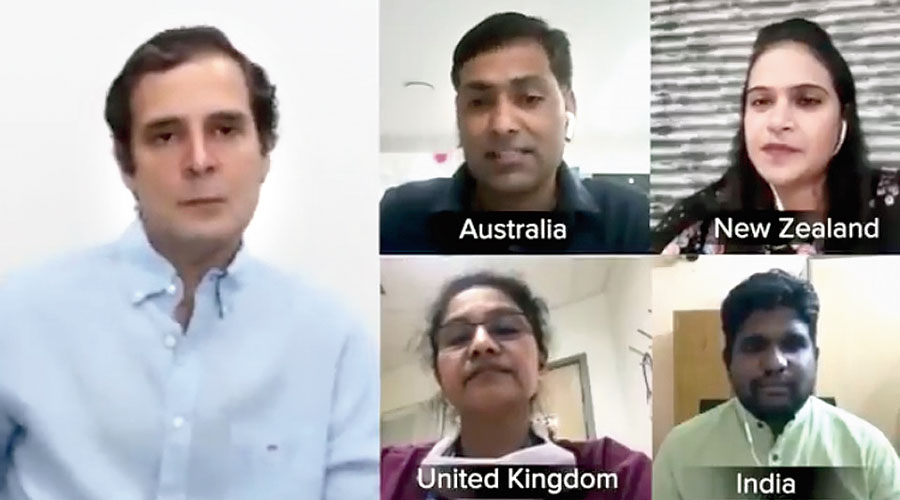Health workers in many countries with excellent healthcare infrastructure but hit hard by the pandemic appear to have much higher levels of satisfaction with the support they received from their governments during the fight against Covid-19 than their counterparts in India, conversations Rahul Gandhi had with nurses seemed to suggest.
The Congress leader on Wednesday had an online conversation with Indian nurses working in different countries, as part of the series of chats he has been having with economists and public health experts on the crisis triggered by the pandemic.
A nurse working in Britain, which has had over three lakh confirmed Covid-19 cases and more than 43,700 deaths, and another in New Zealand, which has so far restricted the number of cases to 1,528 and deaths to 22, had words of praise for the support provided by their governments.
Anu Ragnat, the nurse from New Zealand, told Rahul: “Cities like Auckland, Christchurch, Hamilton — they are pretty crowded. So it could have driven easily into five figures had New Zealanders been careless. So I think going hard and going early was the motto by Prime Minister Jacinda (Ardern). So she’s done absolutely well. So I think going early was really the right thing and that flattened the curve in New Zealand.”
Speaking about the support the health workers received and how they managed their families while treating Covid patients, Ragnat said: “From the New Zealand government, one of the first things announced by the health minister was a ($)10 million package for health workers. So that includes accommodation funding. If you don’t want to go back home, you can stay either in hospital or in a nearby motel and the government would pay for that.”
Referring to the experience of the three other nurses who were part of the conversation with Rahul, including an Indian, Ragnat said: “Listening to the rest of the team, I feel like we are in a blessed position actually.”
She went on: “In New Zealand, the communication between the government and healthcare workers, it was really good. Daily at 1pm during that five-week lockdown, our health minister and our Prime Minister would come and do the press conference and I think almost pretty much all the New Zealanders will be tuned in to hear these numbers, the levels. And the Prime Minister herself, she made us feel responsible for participating and winning this battle. The leadership style was one of empathy in a crisis.”
Sherlylmol Puravady, who has been working in London for the past 21 years, spoke of the fear among health workers in the initial stages of the pandemic but recounted that they were asked to wear personal protective equipment in early March itself and that anybody who came to the clinic was tested to ensure separation of Covid and non-Covid patients.
“You know, at that time in the UK, we were not even in lockdown. So we had been told we have to use PPE, surgical masks, apron and gloves. Since then I’ve been using that and we were seeing patients. None of the nurses got infected,” Puravady said.
She added: “My husband is actually in the high-risk category and he was in shielding. Because I’ve been working with Covid patients, I had to move out of my home leaving my husband and my children for six weeks. Now I’ve gone back. Two weeks ago I went back home and it’s because the numbers are coming down.
“The number of patients in the hospital is coming down now and my management is so supportive of me. Here in the UK, people are so respectful. We have dedicated shopping time for the healthcare staff or the care workers. It is so supportive, all supermarkets are very supportive.”
While clapping, lighting of lamps and showering of flower petals from fighter jets have happened in India too, countless stories of health workers being targeted by residents of their localities, the shortage of PPE kits in almost every hospital, non-payment of salaries and lack of accommodation to protect family members of healthcare workers have spoilt the track record.
In April and May, health workers in several states had to launch protests and go on strike at many hospitals because of poor facilities.
Vipin Krishnan, a nurse from AIIMS who was part of the conversation with Rahul, referred to some of these problems, in addition to issues such as shortage of staff, inadequate testing facilities and salary cuts for nurses in private hospitals. Vipin, who got infected along with his wife, however, expressed his resolve to return to the Covid ward to serve patients despite the shortage of facilities and support.
Narendra Singh, who works at a hospital in Australia where too the number of cases has been limited to 7,834 along with 105 deaths, agreed with Rahul who expressed surprise that most private hospitals in India were not allowed to do testing.
Singh said: “If you go to private hospital and then you can’t test, it is very hard to manage. Because, you can spread very easily to the other staff as well and then the whole hospital staff can get infected.”
Rahul explained why he spoke to the nurses, saying: “There are some of you who are abroad, some of you who are working in India. All of you have a different experience. I wanted to have a conversation, so we could get a sense of what different people are seeing in different parts of the world and how they can help each other.
“The second aspect is that I wanted that you should feel, not just you, but as a community that you should feel that we are with you. We understand that you are doing a dangerous job. We understand that this is not an easy job. We understand that you are putting your lives on the line for this and we appreciate greatly what you are doing all over the world and in India.”











